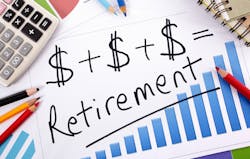Retirement plans: How can dentists nearing retirement become more prepared?
Retirement planning can be daunting for dentists. Are you saving enough? Have you explored your different options? But mainly, will you be prepared when the time arrives? Here are some helpful guidelines from an expert.
_______________________________________________________________________________________________________________________
DENTISTS NEAR RETIREMENT HAVE A VARIETY OF CONCERNS:
• Have I saved enough?
• What will my retirement income be?
• Will I run out of money?
• How does selling my practice fit in?
• Is a 401(k) or an IRA my best or only option?
• What am I missing?
• How does all of the “stuff” I have fit together?
In my last two articles article about retirement plans for dentists, Retirement plans: Know your limits: Update on retirement plan options for dentists, and Retirement plans: Is a 401K the only option for dentists? I outlined a few of the basic retirement plan options dentists can consider for their practice, and the contribution limits for those options. What else should dentists be doing near retirement to improve their chances of success?
REMEMBER TO CONSULT WITH YOUR TAX ADVISOR and a qualified financial advisor before starting a retirement plan. The information in this article is a summary, and each plan has nuances that must be considered before choosing the one for you and your practice.
Take advantage of your maximums
The first step in reaching your retirement savings goal is to take full advantage of your current practice retirement plan (generally a 401k, or SIMPLE IRA) and if you do not have one, to start one now. A well-designed retirement plan can allow you to save anywhere from $12,500 to $18,000 of your own savings, plus potential matching and catch-up dollars. Add in a profit sharing component and the amount you could save could jump up as high as $59,000!
Not sure how much you should save? Check out thisRetirement Income Calculator* to get started.
Keep an eye on your current plans
If you’ve established a retirement plan through your practice, annual reviews are part of your success, not only for the appropriate investments, but for Department of Labor compliance. Lots of things have changed in the regulatory world for retirement plans, so it is vitally important to ensure your plan remains in compliance.
This is the time to ensure that the overall costs of your plan, both to your practice and the participants, are in line with industry standards. As an employer, a dentist is considered a fiduciary** and has certain responsibilities for making sure the plan in compliant. This is not a do it yourself item! Be sure to meet with your professional advisors annually to make sure your plan is compliant.
You should also review your individual accounts (generally IRA or Roth IRA) at least annually, and in some cases quarterly. These reviews also address investment appropriateness and expenses.
Optional strategies
Once you have a handle on your current retirement plans and you’re maximizing everything you can do with them, what are some ideas if you still have funds you want to save? One idea is non-qualified deferred compensation. If you have a C corporation, you can implement this type of plan. If not, you have other options, but those are specific to individual circumstances.
Another idea is to use a portion of your current 401(k) to create a predictable income stream using an annuity. The “in-service withdrawal” allows those who have reached age 59½ to transfer part of their 401(k) into an individual account, which can increase flexibility or possibly create additional income benefits. You can learn more about in-service withdrawals by clicking here to read my short article.
Know how your practice fits in
What is your practice worth? That is often a tough question for dentists to answer. The better question is, “What will my practice sell for?” In short, if you transition your practice on good terms, meaning you are healthy and the sale is planned as opposed to due to disability or death, you should expect to get something out of it. Knowing that number, the tax ramifications, time-to-cash, and how to use the proceeds are vitally important to retirement success.
If you own the building where your practice is located, that adds in some additional considerations, including a separate real estate transaction or potential rent collection. The team here at Slate, Disharoon, Parrish & Associates LLC have worked with several dentists to navigate these aspects of retirement, and we welcome your questions.
Get the basics tidied up
Now is the time to get your wills, powers of attorney, and other legal documents updated. Having an emergency fund (cash in the bank) is important to cover unexpected expenses, and projecting your living expenses in retirement will go a long way to determine your odds of success.
One of the biggest expenses a dentist, or anyone retiring in in the US, will face are medical expenses. Our firm offers a free health care assessment that help estimate health care costs in retirement. That alone can help dentists get ahead of the retirement planning game.
BOTTOM LINE: Nothing can compare to a well-orchestrated financial plan that involves your attorney, tax advisor, and experienced financial advisor. Many dentists have all of the parts of a plan, but many are unsure how all those parts work together.
* Vanguard Retirement Income Calculator
** Definition of fiduciary
For the most current practice management headlines, click here.
For the most current dental headlines, click here.
Securities offered through Registered Representatives of Cambridge Investment Research, Inc., a Broker/Dealer, Member FINRA/SIPC. Advisory services offered through Cambridge Investment Research Advisers, Inc., a Registered Investment Advisor. Slate, Disharoon, Parrish & Associates, LLC and Cambridge are not affiliated. Cambridge does not provide tax advice.
About the Author

Will Parrish
Will Parrish is a founding partner of Slate, Disharoon, Parrish & Associates LLC in Knoxville, Tennessee. He specializes in risk management for his clients, who tend to be business owners and professionals. Will focuses on protecting his client’s interests and assets, whether under the umbrella of a comprehensive financial plan or through the use of financial products. Feel free to contact him with questions at [email protected] or (865) 357-7373. Visit sdp-planning.com or connect with him on LinkedIn.
Updated May 2, 2018


